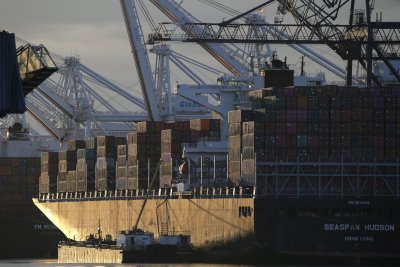
Oct. 17 (UPI) — The United States delayed the adoption of an international requirement for commercial cargo ships to reduce their greenhouse emissions or be subject to fines that is widely supported globally.
Using threats of sanctions and tariffs, and backed by Saudi Arabia and Russia, the Trump administration forced representatives of more than 100 countries to table the International Maritime Organization’s Net-zero Framework, which would have set a mandatory marine fuel standard.
The draft framework, agreed to in April and aimed at reducing greenhouse gas emissions from cargo ships to net-zero by 2050, would have gone into effect in 2027 for all ocean going ships weighing more than 5,000 tons, according to the IMO.
President Donald Trump has referred to nearly all efforts to reduce human impacts on the environment as a “green scam.”
In an Oct. 10 statement meant to put “IMO members on notice,” Trump’s secretaries of state, energy and transportation said that the United States would employ a series of penalties “against nations that sponsor this European-led neocolonial export of global climate regulations.”
“President Trump has made it clear that the United States will not accept any international environmental agreement that unduly or unfairly burdens the United States or harms the interests of the American people,” Secs. Marco Rubio, Chris Wright and Sean Duffy said in the statement.
The new regulation would have gone into effect in 2027 after a standard for ships to reduce their annual gas fuel intensity — the amount of greenhouse gases released for each unit of energy a ship uses — and economic measures and penalties were established at meetings planned for 2026.
The IMO plan was widely supported — Britain, Canada, the European Union, Japan and China were all in favor — and was expected to pass by most of the roughly 100 countries represented at Friday’s meeting.
Although a handful of countries were not in favor of delaying talks about the regulation for a year, the United States persuaded several countries, including China, to join it, Russia and Saudi Arabia to push off negotiations on the deal.
“We are disappointed that member states have not been able to agree [on] a way forward at this meeting,” International Chamber of Shipping secretary-general Thomas Kazakos told reporters.
“Industry needs clarity to be able to make investments,” he said, reiterating the already known overall support the shipping industry reportedly has for the global standard.